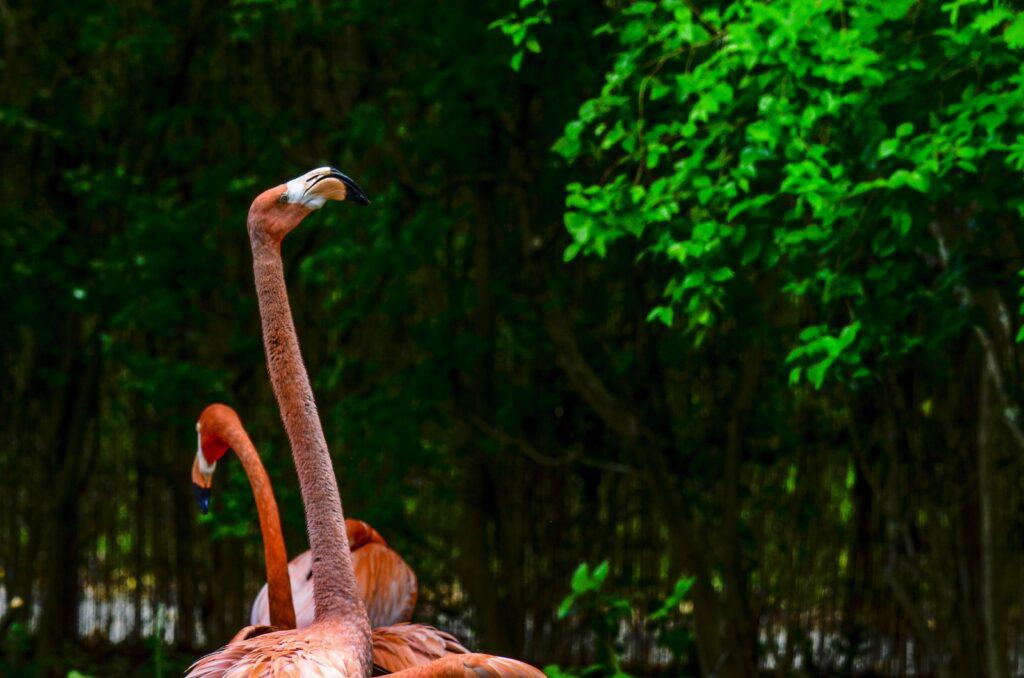Flamingos are a popular attraction at the Miami Zoo, drawing in visitors from around the world to observe their graceful movements and stunning pink plumage. These birds are a sight to behold, and their presence at the Miami Zoo has become a signature part of the zoo’s offerings.
The Miami Zoo, officially known as Zoo Miami, is the largest and oldest zoological garden in Florida. The zoo covers more than 750 acres and houses over 3,000 animals from over 500 different species. Among these species are the iconic flamingos, which can be found in various areas throughout the zoo.
Flamingos are native to South America, Africa, and the Caribbean. They are known for their vibrant pink color, which is caused by pigments found in the algae and small crustaceans that they eat. Flamingos are also known for their long legs, curved beaks, and distinctive long necks. These features make them some of the most recognizable and elegant birds in the world.
At the Miami Zoo, flamingos can be found in several different areas. One of the most popular is the Flamingo Lake exhibit, which is located near the zoo’s entrance. This exhibit is home to a large flock of flamingos, which can often be seen wading in the water or lounging on the shore.
Visitors to the Flamingo Lake exhibit can observe the birds up close and personal, and even feed them if they wish. The zoo offers special feeding opportunities where visitors can purchase food and hand-feed the flamingos, providing a unique and memorable experience.
In addition to the Flamingo Lake exhibit, flamingos can also be found in other areas throughout the zoo. They are often seen in the Africa exhibit, where they share a habitat with other African birds and animals, including zebras, giraffes, and antelopes.
The flamingos at the Miami Zoo are not just beautiful to look at, they also play an important role in the zoo’s conservation efforts. As a member of the Association of Zoos and Aquariums, the Miami Zoo participates in various conservation programs aimed at protecting endangered species and their habitats.
One such program is the American Flamingo Species Survival Plan, which is a collaborative effort among zoos and aquariums to manage and conserve the breeding of American flamingos. The Miami Zoo plays an important role in this program, providing a home for a breeding flock of flamingos and contributing to research efforts aimed at better understanding the biology and behavior of these birds.
The Miami Zoo’s commitment to conservation is reflected in its facilities and practices. The zoo features several state-of-the-art exhibits designed to mimic the animals’ natural habitats as closely as possible. This not only provides a more authentic experience for visitors but also promotes the animals’ physical and mental well-being.
The zoo also has a comprehensive recycling program and uses renewable energy sources such as solar power to reduce its carbon footprint. These efforts demonstrate the zoo’s dedication to not only showcasing amazing animals like flamingos but also to protecting and preserving them for future generations.
In addition to the flamingos, the Miami Zoo is home to many other fascinating animals, including lions, tigers, gorillas, and elephants. The zoo also offers a variety of educational programs and events for visitors of all ages, including behind-the-scenes tours, animal encounters, and summer camps.
Overall, the flamingos at the Miami Zoo are a true highlight of the zoo’s offerings. These magnificent birds are not only beautiful to look at but also play an important role in the zoo’s conservation efforts. Their presence at the zoo is a testament to the importance of protecting and preserving these amazing creatures and their habitats.
If you are planning a visit to the Miami Zoo, be sure to stop by the Flamingo Lake exhibit and take in the sight of these elegant birds in action. And don’t forget to participate in the feeding experience to get up close and personal with these amazing animals.
It is worth noting that flamingos are not just beautiful to look at but also have a fascinating biology and behavior. Flamingos are social birds and live in large flocks, sometimes numbering in the thousands. They have a unique communication system, consisting of various vocalizations and physical displays, which helps them coordinate their movements and maintain group cohesion.
Flamingos are also known for their courtship displays, which involve synchronized movements and vocalizations. These displays are an important part of the breeding process, as they help flamingos form pair bonds and establish territories.
During breeding season, flamingos lay a single egg on a mud nest, which they incubate for about a month. The parents take turns incubating the egg and caring for the chick after it hatches. The chick is initially fed a special milk-like substance produced by the parents, which is rich in fats and proteins. As the chick grows, it begins to eat solid food and eventually develops the iconic pink coloration of adult flamingos.
The flamingos at the Miami Zoo provide a unique opportunity for visitors to observe these fascinating creatures up close and learn more about their biology and behavior. Whether you are a bird enthusiast or just looking for a fun and educational experience, the flamingos at the Miami Zoo are not to be missed.
In conclusion, the flamingos at the Miami Zoo are a true gem, providing visitors with an unforgettable experience and promoting conservation efforts aimed at protecting these amazing birds and their habitats. Their presence at the zoo is a testament to the importance of preserving our planet’s biodiversity and promoting awareness of the amazing creatures that share our world.



